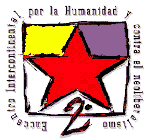

Network of struggles "Press Conference" San Sebastian de los Reyes 27.7.97
After last evening's opening ceremony for the 2nd Encounter held in the
Plaza de Toros of San Sebastian, and a night of music and dancing, this
morning, in the usual confusion which has marked these first few days of
the Encounter - a confusion to which we have become accustomed and
therefore can organise ourselves around - we all took off for Madrid to
take part in the demonstration.
After the demo the majority of Encuentro participants went straight to the
various cities hosting their discussion seminars ("mesa"), except for those
who are to be based in Madrid.
In all the confusion of backpacks, buses and departure timetables, we were
able to hold a first "alternative" press conference, using the banner of
the "alternative press" under which we as comrades of Radio Onda Rossa,
along with many others from Rome - and indeed the world - concerned with
information and self-production are accredited at the Encounter. The
meeting had begun at 7pm on the night before, and was interrupted when
everyone was called away to take part in the Encounter's opening ceremony.
More than a conference, it was in effect a presentation on the part of some
representatives of movements of struggle outside Europe. The principal
problem for all, and an important part of all their struggles, is land:
land understood not as "their" property, but as a means to reappropriate
their own way of life, identity and culture. It is their way of resisting:
the model of community life which attempts to oppose the neo-liberal model
of development.
Following a question concerning the sometimes negative role of
international cooperation organisations raised by a comrade of the Forte
Prenestino social centre in Rome, Rolando Flores of the Argentinian
indigenous national coordination declared that international cooperation
was often complicit with the neo-liberal model of development in
diminishing the strength and identity of indigenous communities. Confirming
this thesis, the Mexican Carlos Beas from the work group "Indigenous
people's justice and human rights" in the state of Oxaca emphasised how
some projects realised in a different manner by solidarity organisations
had instead sustained and aided the indigenous communities' identity and
capacity to resist. There is to be a gathering in Chile in March 1998 where
various Latin American communities will meet together and with
international solidarity organisations, in an effort to strengthen their
resistance and to construct a network of all the resistances: a network
able to unite all the exploited social sectors in each country.
The Chilean representative of CEDELCOOP (Corporacion para la autogestion y
el desarrollo cooperativo) further clarified the problem of the landless
people in that country by describing the immense territories and mineral
resources held there by international capital.
A poetic and passionate intervention was also made by the lawyer Efren
Capiz Villegas, who is general coordinator of the Union de Comuneros
"Emiliano Zapata" (Ucez). All the interventions made clear the need for
alternative channels of communication, given the official media's blanket
of silence on these themes. In particular Beas denounced the silence
concerning the continuing repression in Mexico, despite the recent election
results which have brought an end to the PRI's monopoly and the discrete
affirmation of the PRD: the financial markets may be buoyed, but living
conditions - and sometimes those of death - remain unchanged. And if living
conditions are very grave in Chiapas, others in many other parts of Mexico
face a similar predicament.
Other participants in the conference included Hondaine Mohamed of Agadir
(Moroccan movement of culture and struggle for identity) - Azamir in the
Berber language denied to his people.
Translated by Steve Wright, Zapatista Solidarity Collective, Melbourne Australia